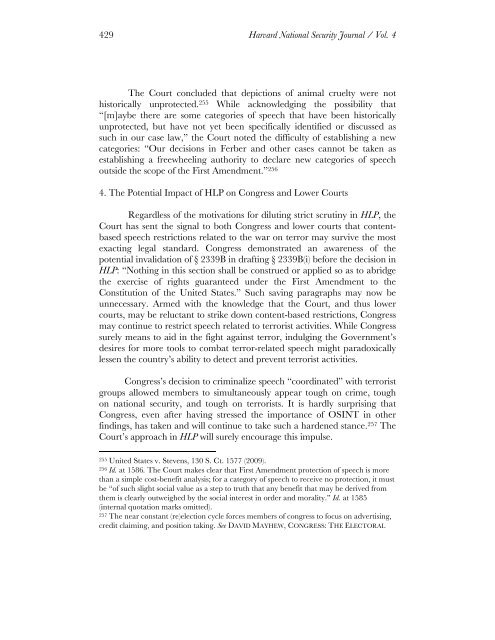Vo.4-Moshirnia-Final
Vo.4-Moshirnia-Final
Vo.4-Moshirnia-Final
You also want an ePaper? Increase the reach of your titles
YUMPU automatically turns print PDFs into web optimized ePapers that Google loves.
429 Harvard National Security Journal / Vol. 4<br />
The Court concluded that depictions of animal cruelty were not<br />
historically unprotected. 255 While acknowledging the possibility that<br />
“[m]aybe there are some categories of speech that have been historically<br />
unprotected, but have not yet been specifically identified or discussed as<br />
such in our case law,” the Court noted the difficulty of establishing a new<br />
categories: “Our decisions in Ferber and other cases cannot be taken as<br />
establishing a freewheeling authority to declare new categories of speech<br />
outside the scope of the First Amendment.” 256<br />
4. The Potential Impact of HLP on Congress and Lower Courts<br />
Regardless of the motivations for diluting strict scrutiny in HLP, the<br />
Court has sent the signal to both Congress and lower courts that contentbased<br />
speech restrictions related to the war on terror may survive the most<br />
exacting legal standard. Congress demonstrated an awareness of the<br />
potential invalidation of § 2339B in drafting § 2339B(i) before the decision in<br />
HLP: “Nothing in this section shall be construed or applied so as to abridge<br />
the exercise of rights guaranteed under the First Amendment to the<br />
Constitution of the United States.” Such saving paragraphs may now be<br />
unnecessary. Armed with the knowledge that the Court, and thus lower<br />
courts, may be reluctant to strike down content-based restrictions, Congress<br />
may continue to restrict speech related to terrorist activities. While Congress<br />
surely means to aid in the fight against terror, indulging the Government’s<br />
desires for more tools to combat terror-related speech might paradoxically<br />
lessen the country’s ability to detect and prevent terrorist activities.<br />
Congress’s decision to criminalize speech “coordinated” with terrorist<br />
groups allowed members to simultaneously appear tough on crime, tough<br />
on national security, and tough on terrorists. It is hardly surprising that<br />
Congress, even after having stressed the importance of OSINT in other<br />
findings, has taken and will continue to take such a hardened stance. 257 The<br />
Court’s approach in HLP will surely encourage this impulse.<br />
255 United States v. Stevens, 130 S. Ct. 1577 (2009).<br />
256 Id. at 1586. The Court makes clear that First Amendment protection of speech is more<br />
than a simple cost-benefit analysis; for a category of speech to receive no protection, it must<br />
be “of such slight social value as a step to truth that any benefit that may be derived from<br />
them is clearly outweighed by the social interest in order and morality.” Id. at 1585<br />
(internal quotation marks omitted).<br />
257 The near constant (re)election cycle forces members of congress to focus on advertising,<br />
credit claiming, and position taking. See DAVID MAYHEW, CONGRESS: THE ELECTORAL
















